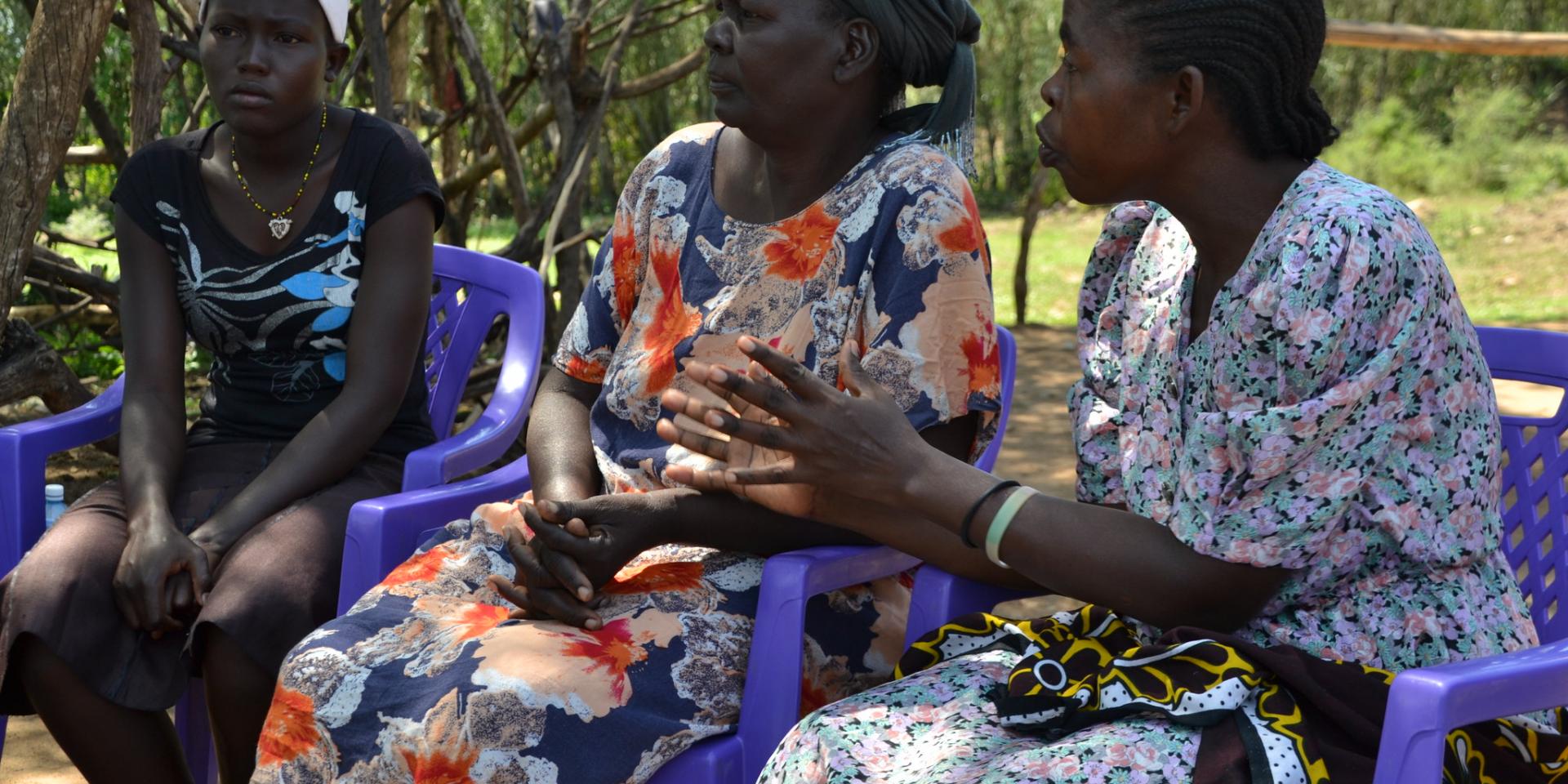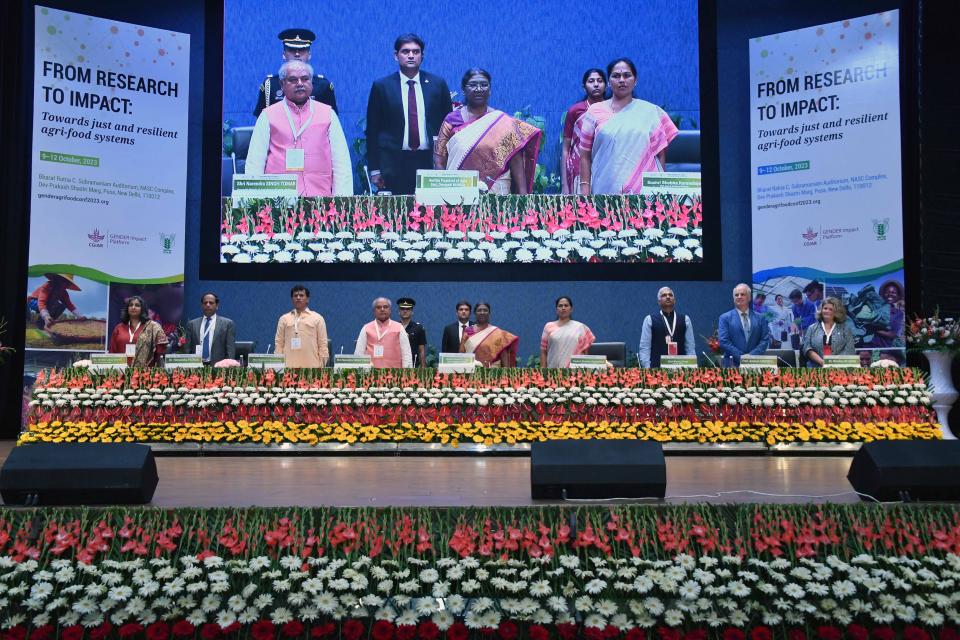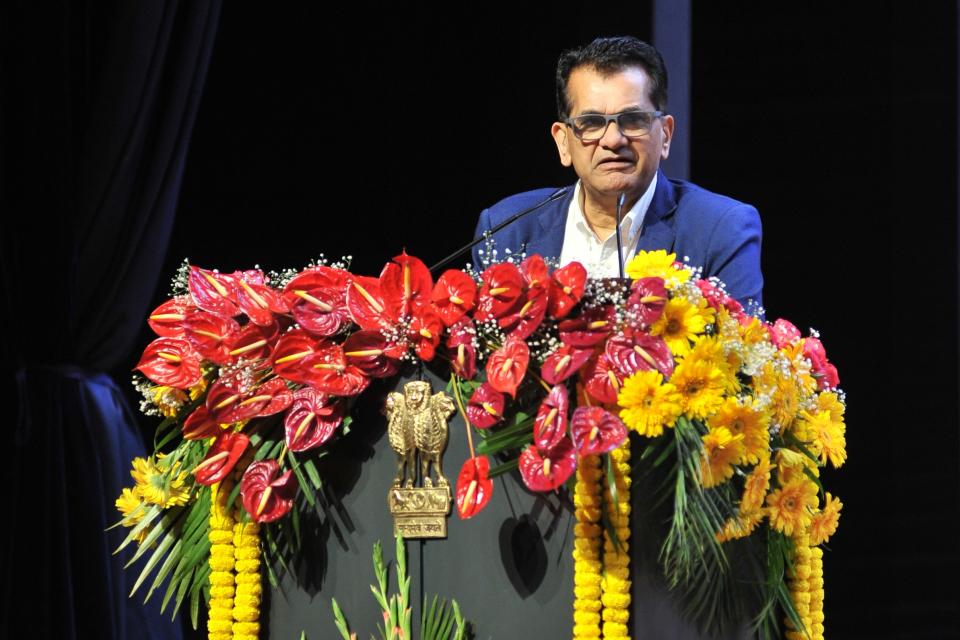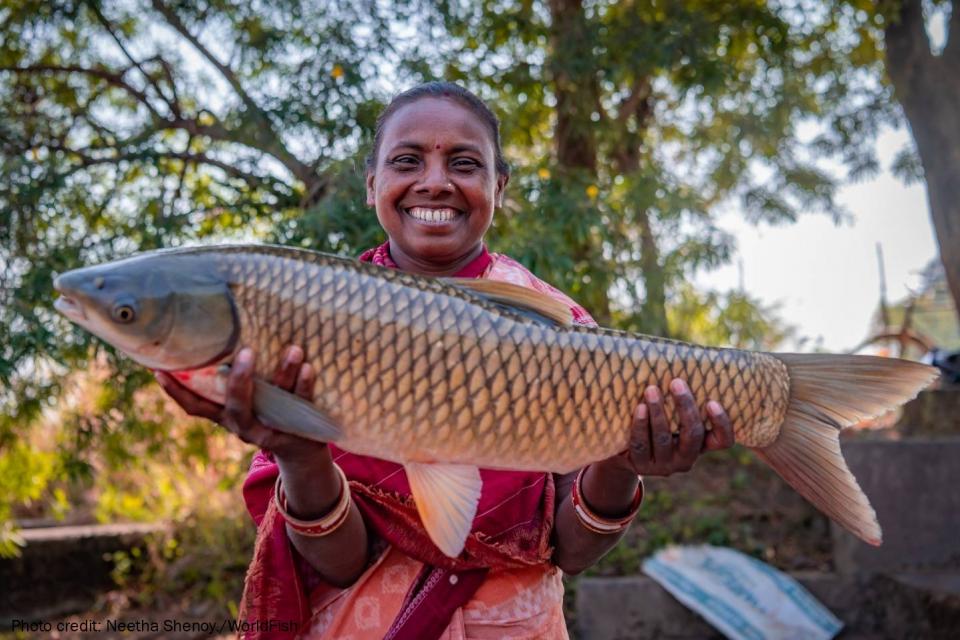From women’s empowerment to gender-transformative change in agrifood systems
 Photo: C. Schubert/CCAFS.
Photo: C. Schubert/CCAFS.
Innovation in agrifood systems must go beyond merely providing women farmers with new types of seeds or irrigation pumps—now, change in agrifood research and development requires of us something more socially sophisticated and transformative.
The 2023 international research conference ‘From research to impact: Towards just and resilient agri-food systems’ hosted by the CGIAR GENDER Impact Platform and the Indian Council of Agricultural Research (ICAR) took place in October 2023. In this series of blog posts, the leads of the event’s six themes reflect on key takeaways from the presentations and discussions that took place under each theme. Here Amon Ashaba Mwiine (Makerere University) and Esther Leah Achandi (International Livestock Research Institute) explore From women’s empowerment to gender-transformative change in agrifood systems.
The conference aimed to share cutting-edge knowledge on gender and inclusion in food systems to help bridge the gap between research and practice; and foster gender-equal, socially inclusive, resilient food systems.
The theme From women’s empowerment to gender-transformative change in agrifood systems focused on research and development aspects of progress from women’s empowerment toward gender-transformative change in agrifood systems.
It facilitated critical reflections on how women’s empowerment, social (gender) norms, masculinities and gender-transformative change are conceptualized, assessed and linked. Research areas also covered approaches and innovations geared toward transforming restrictive social and gender norms that curtail the achievement of equitable, sustainable agrifood systems.
People shared lessons and implications from success stories, and about interventions that have had unintended disempowering effects on women and gender equality in agrifood systems. Presentations were drawn from across different social cultural contexts in agricultural communities.
President of India: Women make a ‘grand bridge from farm to plate’
Over the four days of participant engagement through oral and poster presentations, panel sessions, and discussions on women’s empowerment, there were key insights on:
- the conceptualization of women’s empowerment
- how women’s empowerment is measured
- its contribution toward improved outcomes for agrifood systems
- ultimately, to gender-transformative agriculture
Presentations across the different topics in this conference theme echoed women’s central roles and participation in different stages of agriculture production. The President of India, her excellence Droupadi Murmu [7 minutes long; YouTube], noted during her inauguration of the conference that:
Women sow, grow, harvest and process to get us food. They are indispensable in making a grand bridge from farmto plate. But still, across the globe, they are held back by discriminatory social norms and are denied access to knowledge, resources, assets and social networks. Their contribution is not recognized, their role is marginalized, and their agency denied in agrifood systems. This story needs to change.
Conference presentations also emphasized the message that women’s empowerment could bring a paradigm shift in agriculture and contribute to agricultural transformation. For instance, in his remarks, CGIAR interim Executive Managing Director Prof. Andrew Campbell observed, “When women and girls have access to resources, the whole community benefits.”
Empowerment means different things to different people
Within the theme From women’s empowerment to gender-transformative change in agrifood systems, there were calls to examine the conceptualization of empowerment from different perspectives and to consider the desirability of empowerment by different people. For instance, Esther Leah Achandi (International Livestock Research Institute) noted that women understand empowerment as a process that entails a change in the traditional image of the woman as prescribed by traditional gender norms while men understand it as a process along commonly held domains but taking place within the confines of existing gender norms.
Research pointed to the importance of directing attention to different domains of women’s empowerment using both quantitative and qualitative methodologies. Enhanced indices for domains of women’s empowerment and their measurement were highlighted. For example, the Pro-WEAI+MI tool developed by the International Food Policy Research Institute was presented—it seeks to measure women’s voice and agency in climate-related agrifood system governance and another in market inclusion.
Deeper understanding of domains was also shared. For example, a close look at women’s leadership showed that through participation in governance structures, women’s collective agency can be nurtured and their voices in decision-making enhanced. In their panel discussion on Women in action: Leadership and collective agency in commons governance, colleagues from the Foundation for Ecological Security showed how women’s leadership can enhance gender equality and social inclusion by improving women’s participation in decision-making in local institutions, including those that manage common resources. Women’s collective leadership transcended socioeconomic contexts of caste and ethnic backgrounds, and demonstrated the potential of local women’s organizing for social change.
Examining ideas of masculinity and acknowledging intersectionality
Equally, theme presentations highlighted the interconnectedness of and the need to conceptualize women’s empowerment alongside notions of masculinities to contribute toward gender-transformative change in agrifood systems.
From his opening remarks, Prof. Campbell observed that while much of the emphasis on gender has been on women and girls, “gender is men’s business too.” These kinds of conversations also highlighted masculine stereotypes that downplay the role of women as farmers and farm managers, as well as how collective engagement of both women and men in households can foster consciousness about masculine and feminine norms that hinder the transformation of gender relations.
Gender-transformative approaches in agriculture have addressed women’s empowerment alongside notions of masculinities to facilitate collective reflection and learning among women and men. Challenging traditional views of masculinity enables men to live positively and work and live with women as equals. In a presentation on A critical focus on men and masculinities in a feminist pedagogy, Amon Ashaba Mwiine (Makerere University) elaborated on how gender and agricultural training that build capacities in gender analysis (that includes a focus on men and masculinity) is core to transforming deep-rooted social norms and practices that limit attainment of gender equality. And in a presentation on women and aquaculture in Bangladesh, SM Faridul Haque (International Fertilizer Development Center) observed that household-level gender exercises create an enabling environment for both women and men to be agents of breaking down gender biases by challenging existing harmful norms.
There was continued emphasis on development and maintenance of national statistical systems to prioritize collecting and analyzing gender-disaggregated data that can support assessments of the gender impacts of agrifood policies.
For gender-transformative change to be realized, researchers also shared evidence linking restrictive social and gender norms to women’s empowerment, particularly pointing to the need to address restrictive gender norms around women’s engagement in agrifood systems. In addition to the gender lens, there were calls to incorporate intersectionality by centering the experiences of people from diverse backgrounds to move toward more gender-transformative approaches within agrifood systems.
Questions from the conference spur us onwards toward transformation
What left a great impression on us was the wealth of evidence on the importance of women’s empowerment and gender-transformative change in the transformation of agrifood systems. This transformation is possible: the evidence points to this—through policies, multistakeholder partnerships, alliance building and collective reflection on social and gender norms that hold gender equality back.
Additionally, there were cautions about aspects to pay attention to in the pursuit of women’s empowerment and gender transformation: How do we keep an eye on agriculture innovations to ensure they do not inadvertently reproduce the gender inequalities we intend to address? Moreover, how do we identify and measure changes in social norms that limit women’s empowerment and, ultimately, their resilience and adaptive capacity?
This evidence and questions form part of the future research agenda to ensure progress toward transformative agrifood systems.


